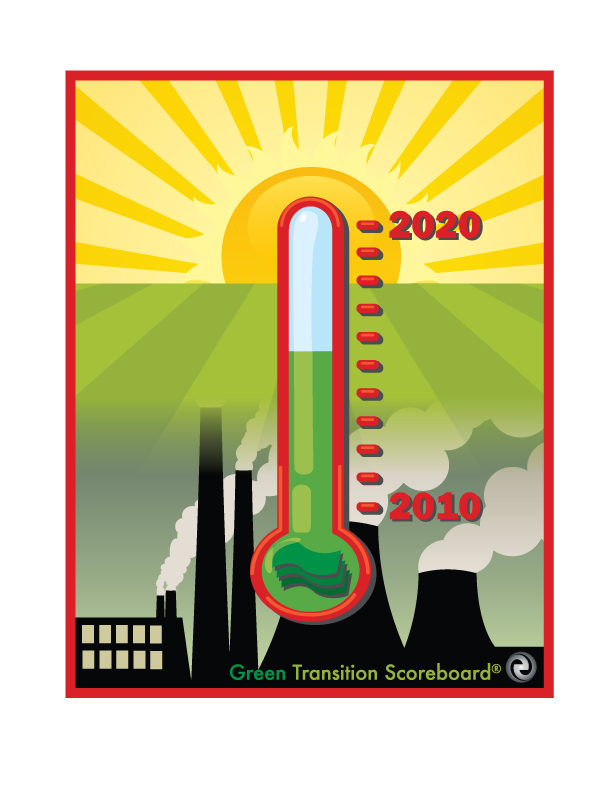Green Transition Scoreboard® Tops $5.3 Trillion Privately Invested In The Green Economy
Published 03-31-14
Submitted by Ethical Markets Media

Again for 2014, the Green Transition Scoreboard® (GTS) finds, with $5.3 trillion in private investments and commitments since 2007, the green economy is on track to reach $10 trillion in investments by 2020 to effectively scale innovations and reduce costs in green technologies as the world transitions to the Solar Age.
The 2014 GTS report Plenty of Water! focuses on the many water investment opportunities as global policy makers, businesses and civic society realize water is critical to environmental, social and human capital, and must be integrated into financial markets rather than overlooked as an externality. The Water sector added $484 billion to the GTS, 9% of the overall total and more than either Green R&D or Cleantech.
GTS sectors follow substantial capital investments in technologies which Hazel Henderson, GTS founder and president of Ethical Markets, has gained from years of research as a science advisor and which the Ethical Markets Advisory Board expertise indicate are continuing to contribute to the growing green economy worldwide. In addition to Water, the GTS tracks Renewable Energy ($2.6 trillion), Energy Efficiency ($1.1 trillion), Green Construction ($512 billion), Green R&D ($363 billion) and Cleantech ($258 billion).
Henderson says of the report, “We are mapping the global transition from the fossil-fueled Industrial Era to the more equitable, cleaner, knowledge-richer green economies to sustain our human future.”
The upward trend reported since 2009 aligns with Ethical Markets’ recommendation to invest at least 10% of institutional portfolios directly in companies driving the global Green Transition to appropriately update strategic asset allocation models both as opportunities and as risk mitigation. A 2012 report by Mercer suggested 40% of portfolios should be in Green Transition sectors.
The GTS definition of 'green' omits nuclear, clean coal, carbon capture & sequestration, and biofuels from feedstock other than saltwater-grown algae. Fossilized sectors are becoming increasingly stranded assets as perverse subsidies are targeted, low-carbon regulations are implemented and oil, coal and gas reserves become more costly and harder to exploit. Nanotech, genetic engineering, artificial life-forms and 3D printing are considered on a case by case basis. The GTS omits government and institutional investments.
Green technologies and infrastructure investments are the next evolution in finance, building on earth systems science and information from satellites tracking conditions on Earth. GTS data sources include NASA; well-respected Cleantech, Bloomberg, Yahoo Finance, Reuters; UN and other international studies; individual company reports; indexes such as Calvert, Domini and Pax World; PowerShares Cleantech Portfolio, Dow Jones Sustainability Indexes, London's FTSE4GOOD, NASDAQ OMX Green Economy Index, ASPI Eurozone; newsletters and stock reports from around the world posted daily at www.ethicalmarkets.com. Sources of financial data are screened by rigorous social, environment and ethical auditing standards.
Fritjof Capra, author of the Tao of Physics and co-author with Henderson of Qualitative Growth, extols the report as “Great work. Most impressive!”
Key findings include: Renewable Energy – as installation costs decrease, growth in megawatts brought online continue to increase, out-pacing most conventional energy sources. Energy Efficiency – a “hidden energy source,” efficiency investments regularly have a 2-4 year ROI. Green Construction – even as definitions tighten, this conservatively reported sector only counts green construction materials, excluding labor, and continues to grow steadily. Water – investment opportunities are often overlooked; using the abundant saltwater on Earth, which can irrigate halophyte agriculture in deserts, is largely ignored. Those paying attention are funding steady growth. Green R&D – significant Green R&D shows sustainability integrated into a company’s core strategy, a strong futures indicator for investors. Global commitment to sustainability is shown in the up-swell in green patents, while fossil-fueled technologies remain flat. Cleantech – one of the best performing sectors in private markets globally. Extreme pollution in China, Korea’s play as a “green” leader and Japan’s demand for homeland energy solutions are driving cleantech in Asia.
This report, as well as Henderson’s Mapping the Global Transition to the Solar Age: from Economism to Earth Systems Science, will be presented at the Ethical Markets/Endobility conference on “Finding Ethical Alpha,” May 12-13.

Ethical Markets Media
Ethical Markets Media
* Reforming finance and growing the green economy worldwide* Ethical Markets provides news and perspective on Climate Prosperity, Reforming Global Finance, SRI and more by gathering information from around the world with analysis by our editor-in-chief, Hazel Henderson.
More from Ethical Markets Media

